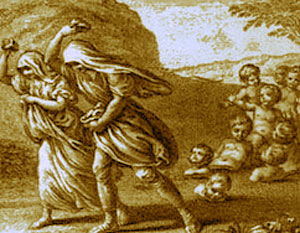The Myth of Deucalion

In the meantime Zeus opens the waterfalls of Heaven and the land of Greece is filled with water and the people perish. For nine days and nine nights the royal couple wanders through the waters in the ship. On the tenth but one day he ran aground on Mount Orthrys, according to another version, on Parnassus. There, when the rains stopped and the waters receded, Deucalion and Pyrrha went ashore and the first thing they did was sacrifice to Zeus the Fugitive.
The god invoked by the pious Deucalion sent Hermes to bring them the promise that Zeus would grant their first wish. And the first wish of Deucalion and Pyrrha was none other than that Zeus would give life to the human race again.
According to another version their small boat ran aground on the only dry spot on earth, the peak of Parnassus. As the waters receded and the elderly couple abandoned the boat, they were suddenly faced with the terrifying realization that it would be their job to repopulate the Earth.
Understandably horrified by this prospect, they decided to seek advice from Themis. They traveled to her oracle site and prayed for guidance. Moved by their piety, Themis gave them this divine message:
“Leave this shrine, cover your heads and loose your clothes, then throw the bones of your mighty mother behind your back.”
After a few moments of confusion, they realized that Themis meant their common mother, Mother Earth. Deucalion thought that the bones of Mother Earth must be the stones on the ground, so they followed the divine advice and threw stones over their shoulders. All the stones thrown by Deucalion turned into men, and all the stones thrown by Pyrrha turned into women. and so, says Ovid.
Deucalion and Pyrrha acquired, in addition to Hellenus, Amphictyon, Protogenia, Melanthoσ, Thyia (or Aithyia) and Pandora. Their firstborn son Ellin became the progenitor of the Greeks. Amphictyon ruled Athens after Cranaoσ. Deucalion himself became the king of Phthia and Thessaly.
In this way, Deucalion and Pyrrha were able to repopulate the Earth – and, even in their old age, they were also blessed with children of their own, many of whom were considered extremely important in the creation myths of Greece.
